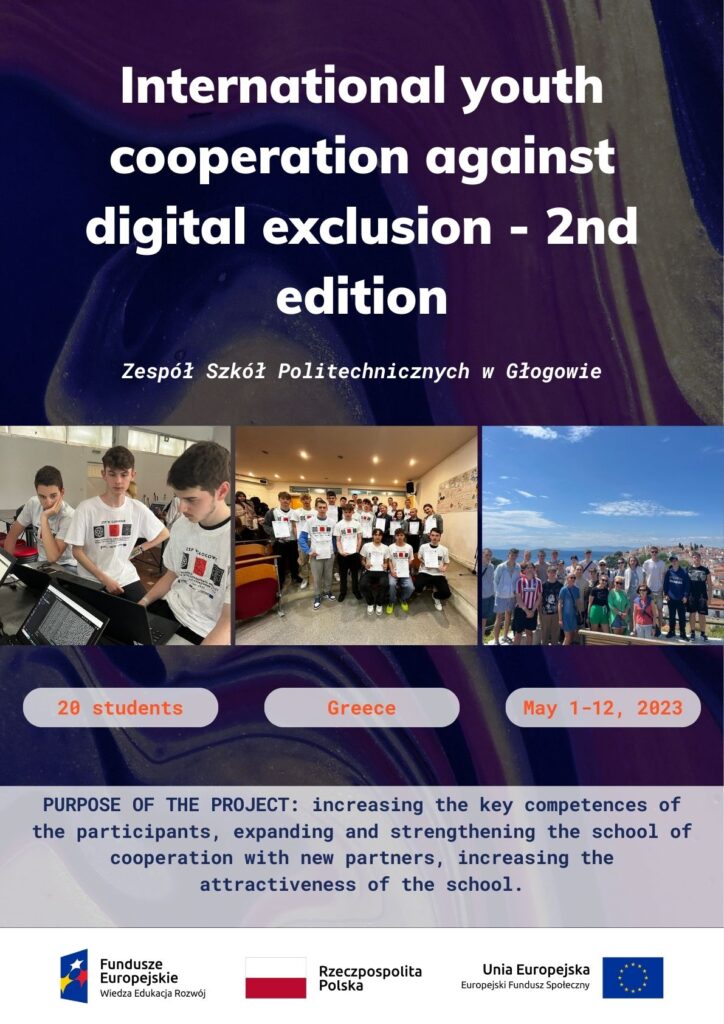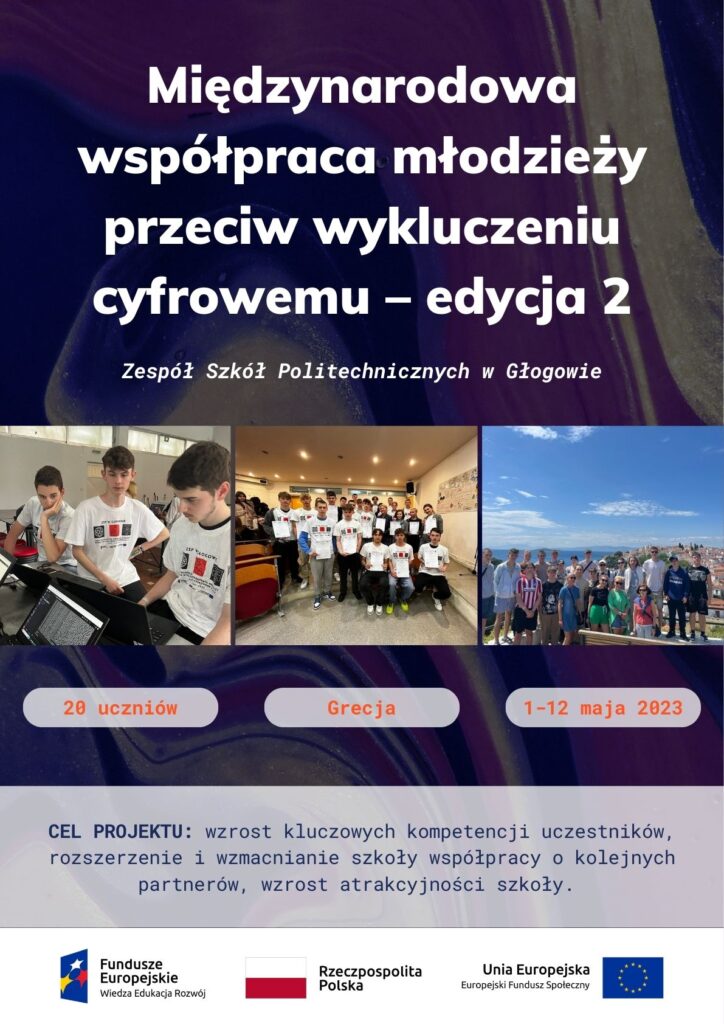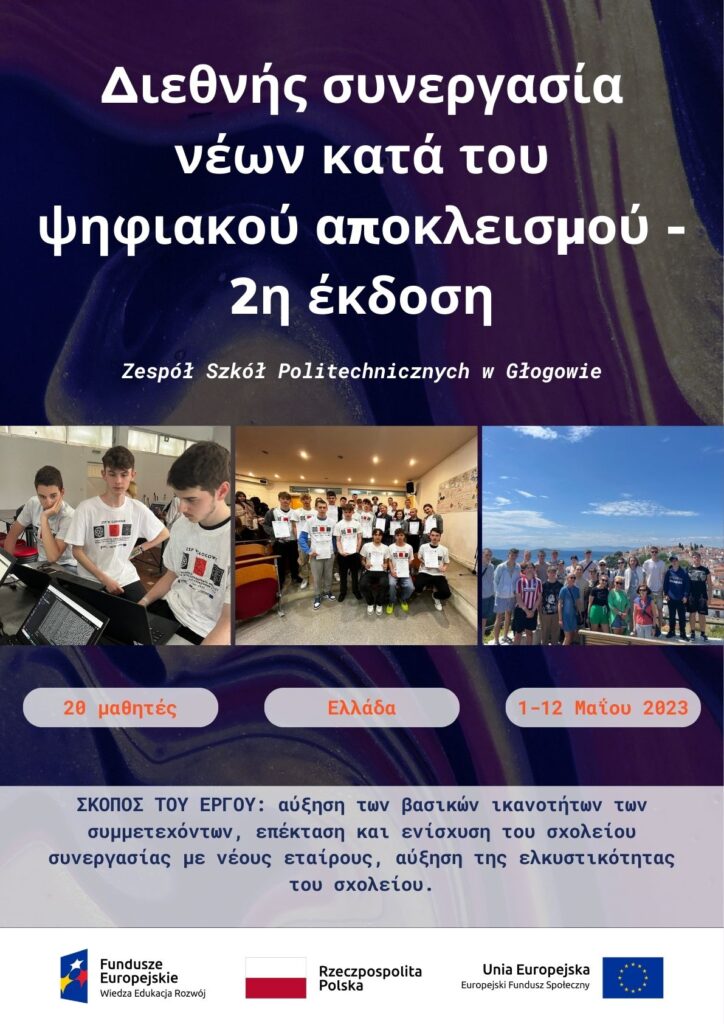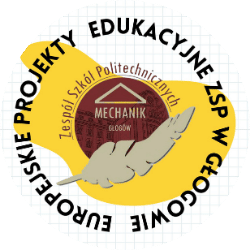Międzynarodowa współpraca młodzieży przeciw wykluczeniu cyfrowemu – edycja 2
W ramach programu Ponadnarodowa Mobilność Uczniów odbyła się druga edycja projektu „Międzynarodowa współpraca młodzieży przeciw wykluczeniu cyfrowemu” o numerze 2021-1-PMU-4342. Projekt realizowany był w terminie od 30 kwietnia 2023 do 13 maja 2023, wliczając dwa dni podróży. Uczestnikami projektu byli uczniowie
klas II-III-IV w zawodzie technik programista i technik informatyk.
Celem przedsięwzięcia było zwiększenie świadomości młodzieży na temat wykluczenia cyfrowego, z jakim borykają się osoby z niepełnosprawnościami i osoby
starsze. Projekt skupił się na osobach z ograniczoną percepcją, interakcją lub trudnościami w zrozumieniu treści internetowych. Zgodnie z raportem dostępności z
2019 roku, nadal 40% stron publicznych nie jest dostosowanych do potrzeb osób z niepełnosprawnościami, chociaż istnieją narzędzia cyfrowe, które mogą rozwiązać ten problem. Projekt miał na celu podniesienie świadomości młodzieży na ten temat oraz dostarczenie im wiedzy i narzędzi, które pozwolą im przeciwdziałać wykluczeniu cyfrowemu.
Podczas realizacji mobilności uczestnicy zdobywali wiedzę i konkretne umiejętności z zakresu dostępności stron internetowych zgodnie ze standardem WCAG 2.0 (Web Content Accessibility Guidelines). Standard ten obejmuje takie zagadnienia jak percepcja, funkcjonalność nawigacji, czytelność i solidność stron internetowych.
Projekt podzielony był na etap przygotowawczy i etap realizacji. W fazie przygotowawczej uczestnicy zapoznawali się z tematyką projektu, określali szczegóły i cele mobilności oraz przygotowywali się merytorycznie.
Etap realizacji obejmował mobilność, podczas której odbywały się zajęcia formalne i nieformalne, prace w grupach projektowych, analiza dostępności stron internetowych oraz program kulturalny. Praca została zorganizowana w międzynarodowych polsko –
greckich grupach, w każdej z grup znalazło się 5 uczniów z Polski i przynajmniej 2-3 uczniów ze Szkoły przyjmujące. Każda z grup miała dedykowanego Mentora wybranego z kadry Szkół. Zajęcia przeprowadzane były w szkole partnerskiej – 2 Liceum w Katerini. Uczniowie wspólnie pracowali nad materialnymi rezultatami projektu, decydowali o szczegółowym zakresie opracowywanych materiałów, dokonali wyboru stron internetowych, które poddali audytowi oraz tematyki broszur. Każda z grup przygotowywała także treści na stronę internetową projektu. Na koniec mobilności uczniowie przedstawili efekty swojej pracy, które zostały ocenione.
Efektem materialnym projektu było opracowanie audytów wybranych stron internetowych pod kątem dostępności zgodnie ze standardem WCAG 2.0, stworzenie broszury informacyjnej dotyczącej wykluczenia cyfrowego oraz wzorcowej strony internetowej projektu prezentującej cele, działania i rezultaty. Rezultaty wypracowywane przez uczniów dostępne są pod adresem:
– https://politechniczna.pl
Rezultaty niematerialne obejmowały wzrost kompetencji uczniów, zarówno w zakresie cyfrowym, jak i kompetencji kluczowych, oraz rozwój wiedzy i doświadczenia kadry
nauczycielskiej.
Podczas mobilności uczestnicy mieli okazję uczestniczyć w licznych międzynarodowych zajęciach, warsztatach i wycieczkach, które miały na celu rozwijanie ich umiejętności i poznawanie greckiej kultury. Uczniowie odwiedzili m.in. zamek w Platamonas, Muzeum Parku Narodowego Olimp Olympus Information Centre,
Saloniki oraz wyspę Skiathos. Odbyło się też wiele zajęć integrujących grupy obydwu narodowości, których celem było poznanie swoich kultur i tradycji.
Projekt przyczynił się do lepszego zrozumienia problemu wykluczenia cyfrowego oraz wyposażenia młodzieży w narzędzia potrzebne do tworzenia dostępnych stron
internetowych. Otworzył młodzież na współpracę w międzynarodowym środowisku i zdecydowanie rozbudził w niej głód poznawania świata i nowych kultur.



International youth cooperation against digital exclusion – 2nd edition
As part of the Transnational Mobility of Students Program, the second edition of the project „International Youth Collaboration against Digital Exclusion” with the
number 2021-1-PMU-4342 took place. The project was implemented from April 30, 2023, to May 13, 2023, including two days of travel. The participants of the project were students from classes II-III-IV in the professions of computer programming and IT.
The aim of the project was to increase the awareness of young people about digital exclusion experienced by people with disabilities and older individuals. The project
focused on individuals with limited perception, interaction, or difficulties in understanding online content. According to the 2019 Accessibility Report, 40% of public websites are still not adapted to the needs of people with disabilities, despite the availability of digital tools that can address this issue. The project aimed to raise awareness among young people about digital exclusion and provide them with knowledge and tools to combat it.
During the mobility project, participants acquired knowledge and specific skills in web accessibility according to the WCAG 2.0 (Web Content Accessibility Guidelines) standard. This standard covers aspects such as perception, functional navigation, readability, and robustness of websites.
The project was divided into a preparatory stage and an implementation stage. In the preparatory stage, participants familiarized themselves with the project’s theme, determined the details and goals of the mobility, and prepared themselves in terms of knowledge. The implementation stage included formal and informal classes, group work, website accessibility analysis, and a cultural program. The work was organized in international Polish-Greek groups, with each group consisting of 5 students from Poland and at least 2-3 students from the host school. Each group had a dedicated mentor from the school’s staff. The activities were conducted at the partner school – 2nd Lyceum in Katerini. The students worked together on the tangible results of the project, determined the specific scope of the materials, selected websites for audit, and decided on the topics for the brochures. Each group also contributed content to
the project website. At the end of the mobility project, the students presented the outcomes of their work, which were evaluated.
The material outcomes of the project included the development of audits of selected websites for accessibility according to the WCAG 2.0 standard, the creation of an informational brochure on digital exclusion, and the development of an exemplary project website presenting goals, activities, and results. The results produced by the students are available at the following links: https://politechniczna.pl
The non-material outcomes included an increase in the students’ competencies, both in the digital field and in key competencies, as well as the development of knowledge
and experience for the teaching staff.
During the mobility, the participants had the opportunity to participate in numerous international activities, workshops, and excursions aimed at developing their skills and learning about Greek culture. The students visited places such as the castle in Platamonas, the Museum of Mount Olympus National Park, Olympus Information Centre, Thessaloniki, and the island of Skiathos. There were also various integration activities for both nationalities to get to know each other’s cultures and traditions.
The project contributed to a better understanding of the issue of digital exclusion and equipped the youth with the necessary tools to create accessible websites. It opened up opportunities for international cooperation and ignited a curiosity for exploring the world and different cultures among the students.
